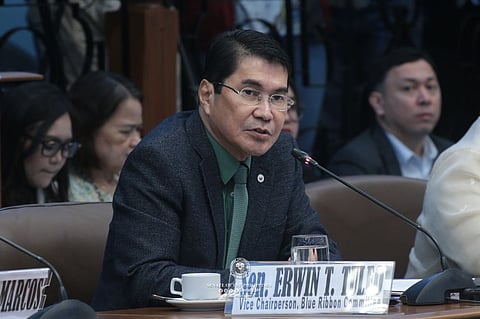
- NEWS
- the EDIT
- COMMENTARY
- BUSINESS
- LIFE
- SHOW
- ACTION
- GLOBAL GOALS
- SNAPS
- DYARYO TIRADA
- MORE

Senator Erwin Tulfo has filed ten legislative measures aimed at strengthening the government’s anti-corruption campaign, boosting transparency, and reinforcing accountability in public service.
At the center of his reform agenda is Senate Bill 1359, which seeks to double jail time for graft and corruption from the current 6-15 years to 12-30 years.
“Public officers and employees must at all times be accountable to the people, serve them with utmost responsibility, integrity, loyalty, and efficiency, act with patriotism and justice, and lead modest lives,” Tulfo said.
“By increasing the penalties, we are sending a clear message that betrayal of public trust has severe consequences.”
He also proposed amendments to the Bank Secrecy Act, allowing courts or authorized investigative bodies to examine bank transactions of public officials.
To promote transparency, Tulfo filed his version of the Freedom of Information (FOI) Bill. Under SB 1361, SALNs of national officials and contracts worth at least P50 million must be published online, with no formal request needed.
“An informed citizenry is vital to democracy. Access to accurate and reliable information empowers Filipinos to participate in governance and hold officials accountable,” Tulfo added.
He has also formally requested to co-author Senate President Vicente “Tito” Sotto III’s bill creating an Independent People’s Commission to investigate anomalies in government projects.
In response to the ongoing probe into alleged corruption in flood control programs, Tulfo filed a bill imposing stricter penalties for contractors and officials found violating public works contracts, including license revocation and criminal charges.
To close accountability loopholes, Senate Bill No. 1362 proposes to regulate foreign travel of government officials under investigation, preventing them from leaving the country while facing legal scrutiny. Penalties include dismissal from service, perpetual disqualification, up to 12 years in prison, and fines ranging from P500,000 to P2 million.
Further, Tulfo introduced SB 1360, mandating the creation of a 30-year infrastructure masterplan and a governing body called the MIND (Masterplan for Infrastructure and National Development) Council to address systemic inefficiencies in infrastructure planning.
“The lack of continuity in our infrastructure plans has caused delays, wasted resources, and missed opportunities. We need a framework that transcends political timelines,” Tulfo stressed.
Complementing this, he filed SB 1358, or the Budget Modernization Bill, which seeks to overhaul the budget process to ensure transparency, fiscal discipline, and public participation, timed amid controversy over the 2025 national budget.
Tulfo also raised concerns about the Commission on Elections’ reliance on LGUs for office space, warning this may expose it to subtle political pressure that could undermine electoral integrity.
Lastly, he filed a resolution seeking an inquiry into the poor implementation of the Ease of Doing Business Act, citing continued complaints from foreign investors about bureaucratic red tape.
“By pushing for these reforms, we are laying out a stronger defense against corruption, safeguarding our coffers, and ensuring that the government will render genuine public service,” Tulfo said.
“The fight does not end in filing these measures, we will shepherd these and ensure that these will be implemented properly.”
